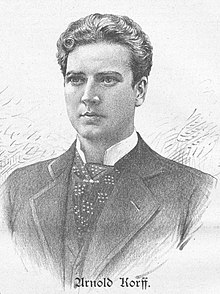Arnold Korff

Arnold Korff (born August 2, 1870 as Arnold PM Kirsch in Vienna , † June 2, 1944 in New York City ) was an Austrian actor .
Live and act
Born in Arnold Kirsch, he worked as a mechanical draftsman and performed on American stages until 1894. The last US residence before moving to Europe was Chicago . In June 1896 he left the USA and went to Austria-Hungary . There he continued his acting career in Proßnitz in Moravia , further stations were Abbazzia , Olmütz and Vienna, where he appeared at the Carltheater and from 1899 to 1913 at the Burgtheater . There he last received the title of kuk court actor. When, due to high private debts, he tried to put the then Burgtheater director Hugo Thimig under pressure with starry airs and demands for fees, he was dismissed and replaced by Harry Walden .
In the theater he played in both classics and popular plays such as Anzengruber's The Perjurer and Nestroy's Lumpazivagabundus . In 1902 he was on stage for the first time in Berlin, where he appeared regularly from 1914. On May 29, 1905 Korff played in the Viennese performance of Frank Wedekind's Die Büchse der Pandora organized by Karl Kraus in Vienna for the private lecturer Dr. Hilti. In September 1915 he returned to New York via Bergen , Norway, to take up an engagement at the Irving Place Theater there. In July 1916 he arrived back in Germany. Since then he has also been seen in films - initially only sporadically. In 1916, the 46-year-old made his debut in fairy hands alongside Henny Porten .
In April 1919 he moved to Zurich for a few years, where he was repeatedly engaged as a guest actor at the Pfauentheater (until it was sold in 1926) and made the acquaintance of James Joyce in 1919 , who on the evening of the Munich world premiere of Banishes together with Korff in his Zurich apartment in Seefeld , where "Korff and his wife, Joyce and Nora and Ottocaro Weiss [...] eagerly awaited a phone call from Munich" to find out how the premiere went.
Since 1920 he has regularly taken on film roles and, as lord of Vogelschrey, was the main actor in the literary film adaptation of Schloss Vogelöd .
In 1923 he returned temporarily to the USA. Korff became a popular supporting actor in the German silent film of the 1920s, sometimes in batch roles such as in Friedrich Wilhelm Murnau's Phantom (1922). Occasionally he also played leading roles such as the detective Henry Beaufort in Joe May's Tragedy of Love (1923) and as Count Osdorff in GW Pabst's melodrama Diary a Lost (1929).
In the late summer of 1929 Korff returned - this time for good - back to the USA, where he took part in several American films. However, his tasks hardly got beyond the batch format. After the end of his film career, he followed various engagements on Broadway . There he could be heard since 1935 in the pieces Love is Not so Simple, Tapestry in Gray, Lorelei, My Dear Children, Another Sun, Liliom, The Family, Thank You Svoboda and, his last appearance in April 1944, The Searching Wind see. From October 1936 he played the Emperor Franz Joseph in the Benatzky -singspiel Im Weißen Rößl .
Arnold Korff died of complications from a heart condition. He had a son of the same name who was born in Vienna in 1917 and died in Pasadena in 1992 .
Filmography
|
|
literature
- Ludwig Eisenberg : Large biographical lexicon of the German stage in the XIX. Century . Verlag von Paul List , Leipzig 1903, p. 531, ( Textarchiv - Internet Archive ).
- Kay Less : The film's great personal dictionary . The actors, directors, cameramen, producers, composers, screenwriters, film architects, outfitters, costume designers, editors, sound engineers, make-up artists and special effects designers of the 20th century. Volume 4: H - L. Botho Höfer - Richard Lester. Schwarzkopf & Schwarzkopf, Berlin 2001, ISBN 3-89602-340-3 , p. 453.
- Kirsch, Arnold; Ps. Korff. In: Austrian Biographical Lexicon 1815–1950 (ÖBL). Volume 3, Verlag der Österreichischen Akademie der Wissenschaften, Vienna 1965, p. 344.
Web links
- Arnold Korff in the Internet Movie Database (English)
- Arnold Korff in the Internet Broadway Database (English)
- Arnold Korff at filmportal.de
- Arnold Korff at The German Early Cinema Database
Remarks
- ↑ Kirsch / Korff himself (allegedly) did not know where he was born. The following can be read in documents from 1897 to 1916: His father, of Swiss origin, came to the USA in 1855. Kirsch, who first called himself Korff as an actor, stated in an application for a US passport on May 9, 1897, St. Louis as the place of birth. In a renewed application for an American passport dated September 6, 1915, which he needed for the return journey to the USA, he named Vienna and in the last passport application of July 12, 1916 for the return journey from New York via Norway and Denmark to Germany he offers both options: "Vienna, Austria, or St. Louis, Missouri". Resident again (now permanently) in the USA, he finally decided on Vienna for the 1930 census
- ^ Richard Ellmann : James Joyce. Revised and supplemented edition. Suhrkamp, Frankfurt am Main 1994, ISBN 3-518-40550-0 , p. 689.
| personal data | |
|---|---|
| SURNAME | Korff, Arnold |
| ALTERNATIVE NAMES | Kirsch, Arnold PM (maiden name) |
| BRIEF DESCRIPTION | Austrian actor |
| DATE OF BIRTH | August 2, 1870 |
| PLACE OF BIRTH | Vienna , Austria-Hungary |
| DATE OF DEATH | June 2, 1944 |
| Place of death | New York City |